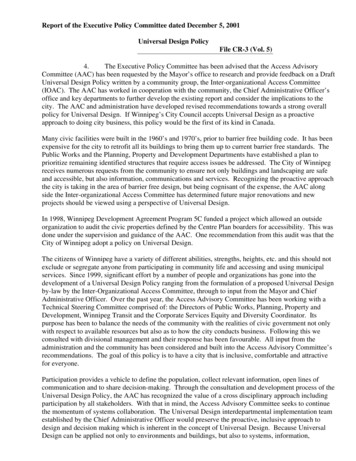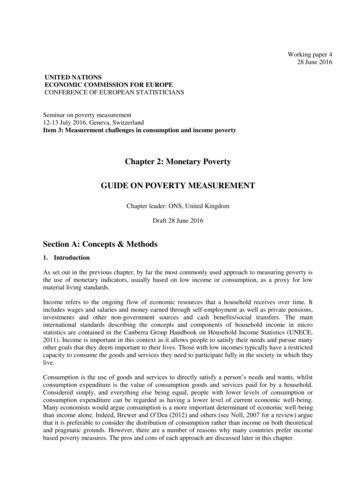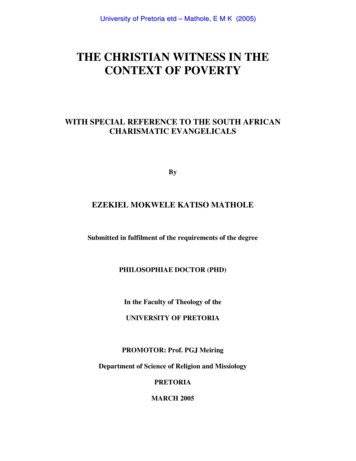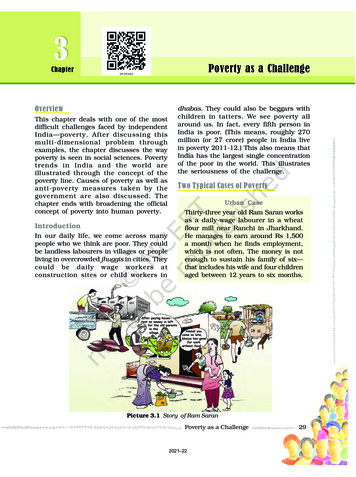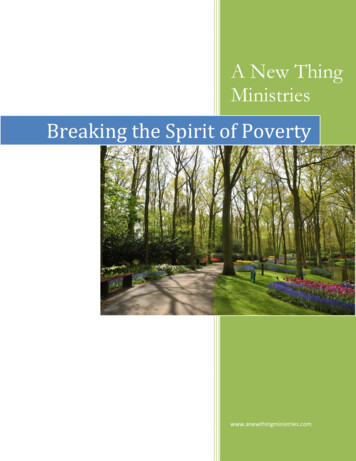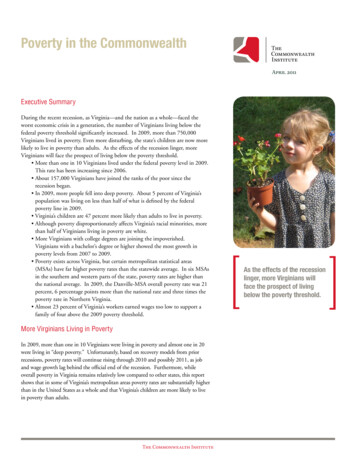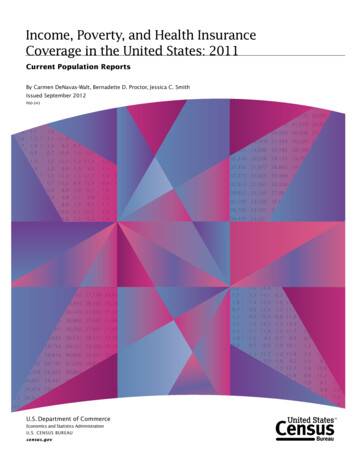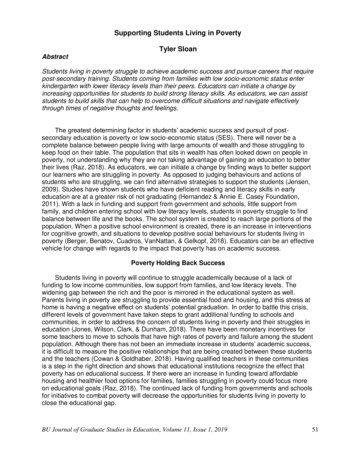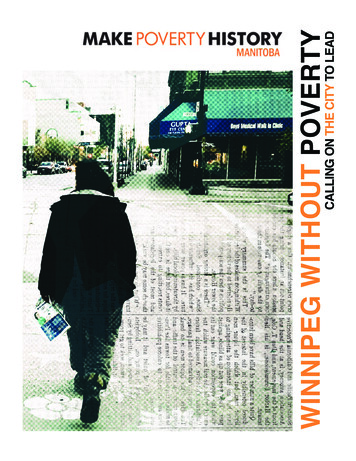
Transcription
Winnipeg Without Poverty:Calling on the City to LeadISBN 978-1-77125-399-4April 2018This report is available free of charge from the CCPA website at www.policyalternatives.ca. Printed copiesmay be ordered through the Manitoba Office for a 10 fee.Please make a donation. Help us continue to offer our publications free online.We make most of our publications available free on our website. Making a donation or taking out amembership will help us continue to provide people with access to our ideas and research free of charge.You can make a donation or become a member on-line at www.policyalternatives.ca. Or you can contactthe Manitoba office at 204-927-3200 for more information. Suggested donation for this publication: 10or what you can afford.We wish to acknowledge funding from the Social Science and Humanities Research Council of Canadathrough the Manitoba Research Alliance “Partnering for Change: Solutions to Inner-City and AboriginalPoverty” project.We wish to acknowledge funding from the Winnipeg Foundation.Front and back cover: Leif NormanUnit 205 — 765 Main St., Winnipeg, MB R2W 3N5tel 204-927-3200 fax 204-927-3201email ccpamb@policyalternatives.ca
ACKNOWLEDGEMENTSWinnipeg Without Poverty: Calling on the City to Lead was created by Make Poverty History Manitoba.Many partner organizations and individuals contributed their time, knowledge, and expertise to thedevelopment of this community-based poverty reduction plan for Winnipeg.Make Poverty History Manitoba thanks:The individuals from partner organizations who contributed as authors.The Project Team for its leadership and for operationalizing project activities Kirsten Bernas (Canadian Community Economic Development Network – Manitoba/West CentralWomen’s Resource Centre) – Researcher and Author Josh Brandon, Christina Maes Nino and Kate Kehler (Social Planning Council of Winnipeg) –Community Engagement Leads Lorie English (West Central Women’s Resource Centre) – Steering Committee Chair Sara Wray Enns (Social Planning Council) – Administrative Support Sarah Leeson-Klym (Canadian Community Economic Development Network - Manitoba) Shauna MacKinnon (University of Winnipeg) – Researcher and Author Molly McCracken and Ellen Smirl (Canadian Centre for Policy Alternatives – MB) Marina Puzyreva – ResearcherThe Steering Committee for guiding the development of this project Abdi Ahmed – Local Immigration Partnership Winnipeg Josh Brandon – Make Poverty History Manitoba John Callahan – Amalgamated Transit Union Chris Clacio – Aboriginal Youth Opportunities David Cron – Manitoba League of Person with Disabilities Sarah Leeson-Klym – Canadian CED Network – Manitoba Cynthia Drebot – North End Women’s Centre Donald Benham/Janelle Duerksen – Winnipeg Harvest Kirsten Bernas/Lorie English/Jolene Wilson – West Central Women’s Resource Centre James Favel – Bear Clan Karen Ferris – Youth Agencies AllianceWINNIPEG WITHOUT POVERTY: CALLING ON THE CITY TO LEADiii
Terra Johnston – Canadian Mental Health Association Manitoba and Winnipeg Kate Kehler – Social Planning Council of Winnipeg Rick Lees – Main Street Project Shauna MacKinnon – University of Winnipeg Greg MacPherson – West Broadway Community Organization Jamil Mahmood – Spence Neighbourhood Association Molly McCracken/Ellen Smirl – Canadian Centre for Policy Alternatives – Manitoba Laiza Pacheco/Floyd Perras – Siloam Mission Dawn Sands – North End Community Renewal Corporation Mike Tutthill – Rainbow Resource Centre Tara Zajac – North Point Douglas Women’s CentreMake Poverty History Manitoba would also like to thank:The many individuals who participated in consultations and and everyone who responded to our requestsfor information, as well as all the organizations who endorsed this report.Thank you to our funders The Winnipeg Foundation and the Manitoba Research Alliance for their generouscontributions.ivMAKE POVERTY HISTORY MANITOBA
Table of ContentsENDORSEMENTS. viiEXECUTIVE SUMMARY.1How Does Winnipeg Measure Up to Other Cities?Call to ActionOur Plan for Winnipeg: Building On What We KnowWHY A CALL TO ACTION.6OUR CONTEXT: POVERTY IN WINNIPEG.7Who is Poor?Other Indicators of Poverty and Social ExclusionAPPROACHES AND LESSONS LEARNED.12Three General Approaches to Poverty ReductionCity-LedCommunity-LedMayor as ChampionHOW DOES WINNIPEG MEASURE UP?.19Who’s Accountable?COMMUNITY CALL TO ACTION:WE NEED OUR MAYOR TO LEAD ON POVERTY REDUCTION.21A Plan for Winnipeg: Building On What We KnowOur Recommendatons1.2.3.4.5.6.7.8.ReconciliationIncome and EmploymentHousingUrban SprawlTransportationRecreationCommunity and Civic EngagementPolicing and SafetyWINNIPEG WITHOUT POVERTY: CALLING ON THE CITY TO LEADv
9.10.11.12.13.Food securityPublic SpacesChild CareHealth and Mental HealthAccessibility RightsADVOCATING TO OTHER LEVELS OF GOVERNMENT.47NEXT STEPS.49Political Will — Mayor as ChampionDevelopment of the Plan and Progress IndicatorsAccountability MechanismsENDNOTES.52viMAKE POVERTY HISTORY MANITOBA
EndorsementsMAKE POVERTY HISTORY MANITOBA received the following endorsements of this documentby time of publication, but will continue to reach out to organizations to endorse. Organizationswishing to endorse, or find out more, are encouraged to contact the coalition at chair@makepovertyhistorymb.com.1JustCityAbilities ManitobaAboriginal Council of WinnipegAboriginal Health & Wellness Centre of Winnipeg, Inc.Aboriginal Youth OpportunitiesACOMI (Association of all African Communities in Manitoba)Aki EnergyAmalgamated Transit Union, Local 1505Andrews Street Family CentreArt from the HeartAssiniboine Credit UnionAssociation of United Ukrainian Canadians – Ukrainian Labour TempleBarrier-Free ManitobaBear ClanBraids of Strength Community NetworkBroadway Seniors Resource CouncilBUILD (Building Urban Industries for Local Development)Canadian Centre for Policy Alternatives – MBCanadian Community Economic Development Network – ManitobaCanadian Mental Health Association, Manitoba and WinnipegCentral NeighbourhoodsWINNIPEG WITHOUT POVERTY: CALLING ON THE CITY TO LEADvii
Central Park Residents Association – Community BuildersCerebral Palsy Association of ManitobaChild Care Coalition of ManitobaClunis ConsultingCUPE-ManitobaDaniel McIntyre/St. Matthews Community AssociationElmwood Community Resource CentreEmployment and Income Assistance Advocates NetworkEpic OpportunitiesFood Matters ManitobaGang Action Interagency Network (GAIN)Graffiti Art ProgrammingGreen Action CentreHomelessness Information Partnership WinnipegHuman Rights HubImmigrant Integration and Farming Co-operativeInitiative for Just CommunitiesInnovative Life OptionsIRCOM (Immigrant and Refugee Community Organization of Manitoba)Islamic Social Services AssociationJonah Community ProjectsJonah CounsellingJubilee FundLived Experience CommunityLocal Immigration Partnership WinnipegLocal Investment Toward EmploymentMacdonald Youth ServicesMain Street ProjectMa Mawi Wi Chi Itata CentreManitoba Association of Community Health CentresManitoba Association of Food BanksManitoba Association of Newcomer Serving OrganizationsviiiMAKE POVERTY HISTORY MANITOBA
Manitoba Childcare AssociationManitoba College of Social WorkersManitoba Federation of LabourManitoba Green RetrofitManitoba League of Persons with DisabilitiesManitoba Low Income Intermediary ProjectManitoba Nurses UnionMARL (Manitoba Association for Rights and Liberties)MASC (Manitoba Association of Community Health)NEEDS CentreNew Directions for Children, Youth, Adults and Families, Inc.New Journey HousingNorth End Community Renewal CorporationNorth End Women’s CentreNorth Point Douglas Women’s CentreNorWest Co-op Community HealthPalaver HutPATH Employability CentrePeg City Car Co-opPoint Douglas Residents CommitteePollock’s Hardware Co-opPSAC (Public Service Alliance of Canada, Prairies Region)Rainbow Resource CentreReconnaissance Management Consulting GroupRed Road LodgeResource Assistance for YouthRestorative Justice Association of ManitobaReturning to SpiritRight to HousingSchool of Social Work, Université de Saint-BonifaceSiloam MissionSocial Planning Council of WinnipegWINNIPEG WITHOUT POVERTY: CALLING ON THE CITY TO LEADix
Spence Neighbourhood AssociationTeen Stop JeunesseThe Canadian Union of Public Employees, ManitobaThe Point PowerLine – North Point Douglas Residents on WatchThe Project GroupThrive Community Support CircleUMFM Campus Radio Inc.UMOJAUnited Food and Commercial Workers Union, Local No. 832Urban and Inner City Studies, University of WinnipegWest Broadway Community OrganizationWest Central Women’s Resource CentreWinnipeg HarvestWinnipeg Labour CouncilWolseley Family PlaceWinnipeg Rental NetworkYou Can’t Spoil A BabyYouth Agencies AlliancexMAKE POVERTY HISTORY MANITOBA
Executive SummaryIN APRIL 2016, EDMONTON HOSTED the Tamarack Institute’s Cities Reducing Poverty: WhenMayors Lead conference. Hundreds of people from across Canada attended. They were inspiredto learn that municipal political leaders are recognizing that they have a responsibility to lead thefight against poverty. While it is true that municipal governments have a limited role and limitedresources, those who attended the conference learned that many municipalities across Canada areno longer willing to defer to other levels of government. A growing number of cities are in variousstages of developing and implementing comprehensive municipal poverty reduction plans.Among those in attendance at the conference were community leaders and front-line service providers from Winnipeg. They heard how Hamilton is crafting a ten-year poverty reduction strategysupported by 50 million in funding for social housing. Toronto’s budget allocated 185 million inpoverty reduction spending. Calgary is becoming a leader in making public transit affordable witha comprehensive low income bus pass program. Edmonton has advocated for an increase in theminimum wage, which the Alberta government has confirmed it will act on. When compared sideby-side with its peers, Winnipeg’s poverty reduction efforts clearly lagged behind these other cities.Winnipeg can learn from best practices in other cities that have made more significant progressin addressing poverty.Those from Winnipeg who attended the conference came back inspired and determined: inspiredby what other municipalities are doing and determined to move Winnipeg forward — determinedto make “poverty reduction” a priority for our Mayor and Council.This determination led to the development of this comprehensive community-based povertyreduction plan for Winnipeg. This is a plan we hope the City of Winnipeg will build from as itdevelops its own poverty reduction strategy led by the Mayor and that we can hold our publicofficials accountable to.Regardless of the measure used, the most recent numbers available for capturing the numberof those living in low income in Winnipeg are too high: 9.6 per cent according to the MarketBasket Measure, 10.1 per cent according to the Low Income Cut Off (after tax), and 13.3 percent according to the Low Income Measure (after tax).1 Some people in Winnipeg are at greaterrisk of living in poverty, including: women, LGBT2SQ communities, youth, Indigenous people,newcomers, and people with physical and mental disabilities.2 Poverty in Winnipeg tends to begeographically concentrated, with inner-city communities tending to experience higher povertyrates, but there are some pockets of poverty in communities outside of the inner city.3WINNIPEG WITHOUT POVERTY: CALLING ON THE CITY TO LEAD1
HOW DOES WINNIPEG MEASURE UP TO OTHER CITIES?Our efforts to develop a community-based poverty reduction plan for Winnipeg began by exploring a variety of poverty reduction plans shaping up in cities across Canada to better understandthe different approaches that have been taken. We interviewed community leaders in Winnipeg,Toronto, Hamilton, Calgary, and Edmonton who are involved in their respective local strategies tobetter understand the different processes and practices being used, what works well, and whereimprovements are required. Through this research, we have found that poverty reduction plansand initiatives in cities across Canada generally subscribe to three basic approaches:1.City-led with no apparent political champion2.Community-led with no apparent political champion3.Mayor as championThere are two major cities leading in the “Mayor as champion” approach: Calgary and Edmonton.One statement made by the Executive Director of Vibrant Communities Calgary was an importantlesson for us as we explored the experiences of other cities: “The single most important criteria fora successful City poverty reduction strategy is having a champion at city hall. In Calgary, MayorNenshi is that champion.”As a result of having political leadership, Calgary and Edmonton are making progress in importantpublic policy areas. Each has a comprehensive poverty reduction plan that has been endorsedby City Council and is being implemented in collaboration with community through a collectiveimpact model. The Mayors in these cities know that it is not within their power to end poverty,but they are taking responsibility where they have jurisdiction, while also providing leadershipin advocating for policy change with other levels of government. For example, Edmonton hassuccessfully advocated to the Province for an increase in the minimum wage to 15 per hour.Both Calgary and Edmonton have negotiated cost sharing with the Province to reduce the costof transit passes for low-income riders. In terms of impact and potential impact, we describe thepoverty plans and strategies in these cities as the ‘gold standard’ in poverty reduction plans, andwe advocate for a similar approach in Winnipeg.Winnipeg’s current approach is best described as community-led with no apparent politicalchampion. Poverty reduction advocates have long called on the City of Winnipeg to create aplan, and now this community-led plan provides a concrete example of what that could looklike. In the past, the City has responded to calls for a poverty reduction plan by deferring to theWinnipeg Poverty Reduction Council (WPRC). But, the WPRC operates as an arms-length entityof the United Way Winnipeg and is guided by a steering committee membership that includesinvolvement from business, education, non-profit, labour, and all three levels of government.As such, the WPRC does not have the power to make municipal policy or budgetary decisionsthat would reduce poverty. Only the Mayor and Council have this ability, and they cannotoffload these responsibilities to another entity. Municipal governments are limited in termsof how much they can do to effectively address poverty. But as we have seen in Calgary andEdmonton, there is much that the City can do when the Mayor is a champion who is willing totake leadership and advocate for changes at other levels of government, rather than defer toothers to take the lead.2MAKE POVERTY HISTORY MANITOBA
CALL TO ACTIONThis report outlines our call to action for the City of Winnipeg to do its part in making povertyhistory in Manitoba through a plan that identifies how the City will use its powers and resourcesto reduce poverty in Winnipeg.Our current Mayor has spoken out publically in support of reconciliation and has embarked theCity of Winnipeg upon a Journey of Reconciliation. Indigenous people are over-represented inpoverty-related statistics and reconciliation will require closing the gap in social and economicoutcomes that exist between Indigenous and non-Indigenous people. The City can do its partby implementing a comprehensive poverty reduction plan as a key piece of its Journey ofReconciliation.We call on the Mayor of Winnipeg to immediately announce that the City considers povertyreduction to be a municipal priority, and that he will begin to work with City Council toward thedevelopment of a comprehensive municipal poverty reduction plan with progress indicators thathave targets and timelines. Within one year, the City should produce a plan that outlines whatit will do, and what it will call on other levels of government to do to improve social, economic,and health outcomes for individuals and families across the city. The recommendations in ourcommunity-based plan should inform the City’s plan in order to build off of the extensive workthat community has already done.To date, the City’s poverty reduction initiatives have been implemented on an ad hoc basis. Butpoverty is complex, with multiple and interconnected causes and consequences. It must be addressed through the simultaneous implementation of multiple actions in various areas: housing,income, recreation, crime prevention through social development, transportation, etc. The Cityof Winnipeg is the only Winnipeg-based entity with the resources and public policy tools to dothis at a city-wide level.An effective municipal poverty reduction plan requires the participation and cooperation ofcitizens, the private sector, the non-governmental sector, and municipal boards and commissionsacross many sectors. These stakeholders should be meaningfully engaged. But in the end, governments have the greatest power to make change that will reduce poverty, inequality, and socialexclusion. Furthermore, they are the only body accountable to citizens.Combating poverty in Winnipeg will require the coordinated efforts of all levels of government.While our recommendations focus on actions to be taken by the City, this in no way absolvesother levels of governments from responsibility. The City should be held primarily accountable forthe success of its own plan. Meanwhile, it should continue to advocate for an increased provincialrole and work with municipalities across the country to call for an increased federal role.We call on the City to put the appropriate structures in place to ensure the successful development and implementation of its poverty reduction plan. Among these structures should be acommittee consisting of City Councillors and community members to provide recommendationsto City Council regarding the development and implementation of the City’s poverty reductionplan and the progress indicators with targets and timelines. The City should also ensure an interdepartmental structure is created consisting of key Directors and Officers who can coordinate anddirect departmental work toward the implementation of the City’s poverty reduction plan.We call on the City to put in place accountability mechanisms that ensure the City‘s povertyreduction plan will be effective and credible. This should include requiring departments to imple-WINNIPEG WITHOUT POVERTY: CALLING ON THE CITY TO LEAD3
ment and report annually on the use of a poverty and social exclusion lens so that City actionsare evaluated for their impact on poverty reduction and social inclusion objectives. The Cityshould also take its poverty reduction plan into account when preparing the annual budget sothat consideration is given to how spending decisions affect the City’s ability to implement itspoverty reduction plan, and to make progress on its indicators of poverty reduction. Finally, theCity should table an annual report to the community that evaluates and reports on the progressit has made in implementing its plan and achieving its poverty reduction targets.OUR PLAN FOR WINNIPEG: BUILDING ON WHAT WE KNOWOur plan builds off of what the City is already doing to reduce poverty and is based on the povertyreduction priorities gathered through community-based consultations and research reports.The development of a comprehensive poverty reduction plan for Winnipeg requires an assessmentof what the City is already doing to address poverty in order to build off of promising initiatives.We asked the City of Winnipeg to provide an inventory, which included numerous initiativesfocusing on themes like recreation and leisure, housing and homelessness, and Indigenous youth.The City notes that its inventory is not representative of absolutely everything it is doing to reducepoverty or to provide initiatives geared towards citizens with lower incomes.Some of the initiatives play a more significant role in reducing poverty and social exclusion thanothers. For example, the Indigenous Youth Strategy is a strategy that plays a more significantrole, with its efforts to increase access to recreation and leisure opportunities and grants tocommunity-based organizations that are working to reduce poverty, homelessness, and socialexclusion. Other initiatives, such as providing access to free smoke alarms and one-time financialsupport to cover a utility bill, are more limited in terms of their impact on poverty. Initiatives suchas the Indigenous Youth Strategy should be included and enhanced in a poverty reduction planfor Winnipeg because of their reach and potential impact.There are many other actions that the City could be taking to reduce poverty that are missingfrom its inventory. They are outlined in the recommendations we provide in our plan. Whencompared to the package of actions taken by other municipalities with poverty reduction plans,Winnipeg’s list lacks comprehensiveness and ambition. We conclude that poverty reduction initiatives will have limited impact if the City continues to develop them on an ad hoc basis, rather thanthrough an intentional strategy that will guide planning and priorities.Poverty reduction efforts must also be rooted in community to be effective. In the fall of 2016,Make Poverty History Manitoba convened a Steering Committee of individuals representing morethan twenty community-based organizations with expertise on solutions to poverty reductionand social exclusion. This group guided the development of our community-based poverty reduction plan for Winnipeg through numerous meetings over an 18-month period.For many years, people concerned about poverty have been consulting, researching, and proposing public policy solutions for the City of Winnipeg to implement to play its part in reducingpoverty. Rather than starting from scratch, our researchers compiled the solutions that have beenproposed over the years into key theme areas. These solutions were brought back to the community to prioritize and identify gaps through a series of consultations.Five community-based consultations were held across Winnipeg, which engaged eighty-oneparticipants. Due to limited resources, we were not able to hold consultations in all low-income4MAKE POVERTY HISTORY MANITOBA
neighbourhoods. The City of Winnipeg will need to engage in a more robust consultation processthat includes low-income people living in what are viewed as more affluent neighbourhoods toensure that a Winnipeg poverty reduction plan addresses their unique needs.In addition to holding consultation meetings, surveys were distributed through community partners asking respondents to indicate their top priorities for community action. Ninety-three surveyswere returned. While effort was made to engage the Indigenous community in the consultationprocess, this requires further work to ensure that a Winnipeg poverty reduction plan reflects theunique circumstances of the growing Indigenous population.The fifty recommendations in our plan are not an exhaustive list of everything the City can do, butthey provide an extensive package of actions that demonstrate what it would look like to apply apoverty reduction lens to municipal initiatives in the following areas: reconciliation, income andemployment, housing, urban sprawl, transportation, recreation, community and civic engagement, policing and safety, food security, public spaces, child care, health and mental health, andaccessibility rights.Our recommendations demonstrate that there is much the City of Winnipeg can do to reducepoverty and social exclusion. But provincial and federal governments have control over significantfinancial investments and key public policy areas that greatly impact poverty, and we need all threelevels of government to step up. The City should call on the Province of Manitoba to implementthe recommendations in The View from Here 2015: Manitobans call for a renewed poverty reductionplan. Nearly 100 community organizations endorsed this community-based provincial povertyreduction plan that identifies 50 policy recommendations that the Province of Manitoba shouldimplement as part of a renewed provincial poverty reduction plan. It includes recommendationsin areas like social and affordable housing, employment and income assistance, minimum wage,child care, post-secondary education, and mental health.The City should also call on the Government of Canada to implement the recommendations inthe Federation of Canadian Municipalities (FCM) report Ending Poverty Starts Locally: Municipalrecommendations for a Canadian poverty reduction strategy.4 This document, signed off on byWinnipeg Deputy Mayor and FCM President, Jenny Gerbasi, includes 12 broad recommendationsfor the federal government to include in its national poverty reduction plan. It includes recommendations in areas like basic income, social and affordable housing, and funding to Indigenousorganizations and initiatives.WINNIPEG WITHOUT POVERTY: CALLING ON THE CITY TO LEAD5
Why a Call to Action?IN APRIL 2016, EDMONTON HOSTED the Tamarack Institute’s Cities Reducing Poverty: WhenMayors Lead conference. Hundreds of people from across Canada attended. They were inspiredto learn that municipal political leaders are recognizing that they have a responsibility to lead thefight against poverty. While it is true that municipal governments have a limited role and limitedresources, those who attended the conference learned that many municipalities across Canadaare no longer willing to defer to other levels of government. A growing number of cities arein various stages of developing and implementing comprehensive municipal poverty reductionplans.Among those in attendance at the conference were community leaders and front-line serviceproviders from Winnipeg. They heard how Hamilton is crafting a ten year poverty reductionstrategy supported by 50 million in funding for social housing. Toronto’s budget allocated 185million in poverty reduction spending. Calgary is becoming a leader in making public transitaffordable with a comprehensive low income bus pass program. Edmonton has advocated for anincrease in the minimum wage, which the Alberta government has confirmed it will act on. Whencompared side-by-side with its peers, Winnipeg’s poverty reduction efforts clearly lagged behindthese other cities. Winnipeg can learn from best practices in other cities that have made moresignificant progress in addressing poverty.Those from Winnipeg who attended the conference came back inspired and determined: inspiredby what other municipalities are doing and determined to move Winnipeg forward — determinedto make “poverty reduction” a priority for our Mayor and Council.This determination led to the development of this comprehensive community-based povertyreduction plan for Winnipeg. A plan that we hope the City of Winnipeg will build off of as itdevelops its own poverty reduction strategy led by the Mayor and that we can hold our publicofficials accountable to.6MAKE POVERTY HISTORY MANITOBA
Our Context:Poverty in WinnipegWE DON’T NEED TO LOOK AT DATA to know that people are living in poverty throughoutWinnipeg. It can be seen on our streets, in the makeshift houses people create for themselves, orin the daily lineups outside our shelter services. It can also be seen in our under-resourced community agencies who are unable to adequately serve everyone that comes in for support to accessbasic needs like food, housing, transportation, and mental health services, as well as training andemployment opportunities.However, data can help paint a more accurate picture of the state of poverty in Winnipeg. StatisticsCanada provides a few different measures of low income, which give a sense of how many peopleare living in poverty.5 Each one measures low income or poverty in a different way. Regardless ofthe measure used, the most recent numbers available are too high:Number and per centage of people in Winnipeg living in poverty in 2016:6 i 77,000 (9.6 per cent) — according to the Market Basket Measure 81,000 (10.1 per cent) — according to the Low Income Cut Off (after tax) 107,000 (13.3 per cent) — according to the Low Income Measure (after tax)A look back at these three measures of low income over the last 20 years does not reveal aconclusive trend. The Market Basket Measure and the Low Income Cut Off (after tax) indicate thatpoverty rates have been on a downward trend while the Low Income Measure (after tax) suggestsan upward trend.7 Regardless, in a society as wealthy as ours no level of poverty is acceptable.It’s not just the number of people living in poverty that is concerning, but also the depth ofpoverty. People living in poverty in Winnipeg have incomes that are more than 32 per cent belowcommonly-used poverty lines.8i This data is based on
Amalgamated Transit Union, Local 1505 Andrews Street Family Centre Art from the Heart Assiniboine Credit Union Association of United Ukrainian Canadians - Ukrainian Labour Temple Barrier-Free Manitoba Bear Clan Braids of Strength Community Network Broadway Seniors Resource Council BUILD (Building Urban Industries for Local Development)
